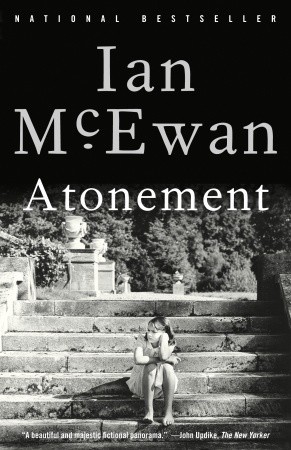
Title: Atonement
Author: Ian McEwan
Genre: Literary Fiction
Publication Date: 2001
Number of Pages: 351
Geographical Setting: England
Time Period: 20th century
Plot Summary:
Briony Tallis is in love with the written word and decides that she want to put on a play for her bothers return to the manor. She recruits her cousin who has come to live with them because their parents are splitting up. Briony gets mad at her cousin and calls off the play and decides to take a walk out on the ground on the night of the dinner and run into Robbie Turner (who is the gardener) and he gives her a letter to give to her sister Cecilia. Since Briony is curious she reads the letter which is not the letter Robbie attended to send and Briony becomes upset. When she later finds Robbie and Cecilia in the library she thinks that her sister is being attacked by Robbie. When the twins run away later that night and everyone is out looking for them Briony comes upon her cousin Lola being attacked in the dark she assumes it is Robbie because of the note and what she thought she saw in the library. This gets Robbie sent to prison and in order to get an early release, he joins the army. The second half of the book is Robbie track to Dunkirk. Briony tries to make up for what she did as a child once she figures out that it was someone else who attacked Lola. Will Briony be able to make up for all the hurt she caused as a child or will her sister and Robbie always hate her?
Subject Headings:
· Sisters
· Guilt in Women
· Rich families
· Shame
· Thirteen-year-old girls
· Former convicts
· Rural life
· Social classes
· Regret
· Redemption
Appeal:
· Character-driven
· Leisurely paced
· Haunting
· Unreliable narrator
Elements of Literary Fiction:
Style/Langue: Words are woven together elegant and the structure of the novel itself may be more complex (Saricks, 178). In this book, you notice that the langue seems to be very descriptive and picked very carefully. I remember thinking that the words were very important and he was able to paint the scene using them.
Characters: In literary fiction, characters can become more important than storylines, and the question is center more around characters then the story (Saricks, 178). This is true in this book that Brinoy is the character that has caused all the problems and is then trying to fix them. She is a multi-dimensional character and is often unpredictable.
Story Line: Are thought-provoking, often consider universal dilemmas and endings are often open or ambiguous (Saricks, 178). In this story, you have Brinoy who unwittingly accuses someone of a crime they didn’t comment and has to try and make up for these mistakes through her life. The ending is kind of ambiguous where you don’t know what happened to everyone in the end.
Pace: slower since these books are usually densely written (Saricks, 178). This story does have a leisurely pace more so at the beginning and starts to pick up some when you get to the second half of the book.
Tone: Usually dark because of the seriousness of the issues (Saricks, 178). I found this book to be very dark because it is dealing with falsely accusing someone of rape, then later that person is sent off to war, and Briony is never sure if she is going to be able to make it up to Robbie or her sister.
Similar Authors and Works:
Read-alikes Nonfiction
The Innocents by Taryn Simon: for those who want to read more about people that have been falsely accused of a crime they didn’t commit.
Dunkirk: Fight to the Last Man by Hugh Sebag-Montefiore: for those who would enjoy reading more about Dunkirk which Atonement talks about in the second half.
Life After Death by Damien Echols: This book is a biography about a man that was falsely accused of a crime and spent 18 years on death row. This would be for someone who was wanting to read more on the falsely accused.
Read-alikes Fiction
A God in Ruins by Kate Atkinson: both are literary historical novels set in the 20th century, spanning both war and peace times.
The Outcast by Sadie Jones: Both are literary novels set in the 20th century England, reflective narratives of secrets, and shame and guilt. In both children make decisions that have unintended consequences.
The Surrendered by Chang-rae Lee: Both books examine events that occur early in characters’ lives that impact who they become.
Excellent annotation! My book club is reading this in a few months! Full points!
ReplyDelete